Language/Czech/Grammar/Prepositions
Here's a lesson on prepositions in Czech:
Prepositions are an important part of any language. In Czech, they are words that indicate the relationship between a noun or pronoun and other words in a sentence. Here are some common prepositions in Czech and how to use them:
V - "in" or "at"
- V knihovně. (In the library.)
- V pondělí. (On Monday.)
- V Praze. (In Prague.)
Na - "on" or "to"
- Na stole. (On the table.)
- Na hrad. (To the castle.)
- Na nádraží. (At the train station.)
Pod - "under"
- Pod stůl. (Under the table.)
- Pod mostem. (Under the bridge.)
- Pod dekou. (Under the blanket.)
Před - "in front of" or "before"
- Před domem. (In front of the house.)
- Před školou. (In front of the school.)
- Před obědem. (Before lunch.)
Za - "behind" or "after"
- Za stromem. (Behind the tree.)
- Za rohem. (Around the corner.)
- Za půlnocí. (After midnight.)
U - "at" or "near"
- U řeky. (At the river.)
- U stolu. (At the table.)
- U auta. (Near the car.)
S - "with"
- S přáteli. (With friends.)
- S knihou. (With a book.)
- S rodinou. (With family.)
Bez - "without"
- Bez peněz. (Without money.)
- Bez jídla. (Without food.)
- Bez vody. (Without water.)
These are just a few of the most common prepositions in Czech. It's important to remember that prepositions can change depending on the case of the noun or pronoun they are connected to. For example, the preposition "s" (with) changes to "se" when connected to a noun in the accusative case, and to "s" again when connected to a noun in the instrumental case.
The best way to learn prepositions in Czech is to practice using them in context. Try writing sentences using the prepositions above, and pay attention to the case of the noun or pronoun they are connected to. With practice, you'll become more comfortable using prepositions in Czech and will be able to communicate more effectively in the language.

